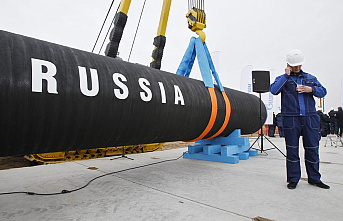Now, it is up to him whether he will continue with his efforts or move further into Ukraine.
In an hour-long speech to Ukraine, Putin indicated his willingness to step up the pressure. The U.S. has "robbed" Russia from historical lands that were lost during the Soviet collapse. The Russian leader seemed to be open to diplomacy, provided that the West accepts Moscow's security requirements.
Russia demands that the U.S. and its allies keep Ukraine, and other ex-Soviet countries from joining NATO, halt weapon deployments there, and reduce alliance forces in Eastern Europe -- demands which the West has rejected as non-starters.
Putin presented a simplified version of his top demands on Tuesday. He demanded that Ukraine renounce its bid for NATO membership, partially demilitarize, and recognize Russia’s sovereignty over Crimea. This is the Black Sea peninsula Russia annexed in 2014 from Ukraine.
Putin stated that NATO's openness to new members is a reason why Ukraine should abandon its plans to join NATO and instead adopt a neutral, non-aligned status.
Putin quickly obtained permission from the Kremlin-controlled parliament for military force to be used in Ukraine. He also insists that he hasn't yet sent troops to rebel areas, despite claims by Western leaders to the contrary.
Putin was asked how far Russian troops would push if they were sent to the rebel east. He replied coyly that it was impossible to predict a particular pattern of action. It will depend on the concrete situation on the ground.
Moscow's latest action was met by new sanctions from the U.S. along with its allies. They also threatened to impose more severe penalties in the event of an invasion. These would include financial restrictions and bans on technology imports. Putin reacted to the threats by saying that Washington would invariably increase sanctions to contain Russia.
Dmitry Oreshkin, a Moscow-based political analyst, stated that Putin has become more aggressive, intransigent, and tougher. He could also contemplate a future offensive to seize territories in the south of Ukraine, all the way to Odessa on the Black Sea. However, he would probably not rush to do so.
Oreshkin said that Putin views himself as a "great collection of Russian lands", which drives him to take bold steps that would be detrimental to national interests.
Russia's leader has shown no remorse as Russia has over 150,000 troops surrounding Ukraine on three sides. This is what the U.S. considers a sign that there will be an invasion.
Putin, in a lengthy rant, scathingly called Ukraine a creation of Soviet founder Vladimir Lenin as well as other Communist leaders of Soviet Union. He said that Ukraine unfairly included large swathes of land once belonging to Russia. Putin mocked Ukraine's efforts to erase the Soviet-era legacy through the "decommunization" process and suggested that the country be named after Lenin.
Putin said, "We are ready for you to see what the real decommunization would be like for Ukraine," in a sign of his willingness to make new land claims against the neighbor.
Sergey Lavrov, the Russian Foreign Minister, also openly challenged Ukraine's sovereignty as well as territorial integrity. He stated Tuesday that these principles only apply to governments that represent whole nations. He also claimed that the "Ukrainian government" does not meet that standard as it doesn't represent the entire country.
Putin stressed that Russia recognizes the rebel areas within the borders they established when they declared their independence in 2014, a sign that could signal more land claims. After the eight-year separatist conflict which claimed over 14,000 lives, Ukraine retains control of around two thirds the Donetsk, Luhansk, and Mariupol, on the Azov Sea.
Putin said that the rebels should negotiate to Ukraine for their borders. However, separatist leaders left open the possibility of a future offensive to seize additional territory. Denis Pushilin, Donetsk separatist leader, said Tuesday that "time would show what next moves will we take."
Russian troops in Ukraine include those that were sent to Moscow's ally Belarus to participate in joint military drills. These drills were supposed to conclude Sunday, but were instead extended indefinitely. These exercises provide the Kremlin with a convenient vantage point to attack the Ukrainian capital which is located 75 km (less than 50 mi) south of Belarus' border.
Putin suggested that he was open to further talks with the West, even though Russia has increased its rhetoric and maintained its combat posture.
Before the Kremlin's latest move, the French President Emmanuel Macron tried to broker a meeting with President Joe Biden. However, the possibility of such an encounter seems dim following Putin's recognition that the rebel territories are legitimate.
Ivan Timofeev (the program director at Russia's International Affairs Council) noted that Putin's actions had effectively put an end to any further negotiations with NATO and the U.S. He stated in a commentary that "there will still be room for diplomacy but there won't be any talk about any kind of negotiations on European security."
Most observers believe Putin will keep his forces close to Ukraine in order to maintain pressure on Kyiv, the West and other countries.
Alexander Baunov, Moscow Carnegie Center stated that Russia was trying to reverse its status as a power that lost the Cold War. He said this in a paradoxical statement.












